Why “Difficult” Kids Make Great Leaders, According to Health-Ade’s CEO
Welcome to Fit for Business, a column from Well+Good’s co-founder and CEO Alexia Brue. Each week, she’ll take you behind the scenes with the most successful healthy-living entrepreneurs around the world, so you can learn what inspires them, what challenges them, and what it’s like to work in the (booming) wellness space.
This week, she sits down with Daina Trout, CEO and co-founder of Health-Ade, the Kombucha brand transforming the fermented tea landscape.
Kombucha was considered a niche beverage, but in the last five years, this fizzy fermented tea has gone mainstream and is today a $600 million beverage category. Health-Ade stands out as one of the most premium and artisanal in this increasingly competitive field thanks in large part to Founder and CEO Daina Trout's passion for brewing in glass jugs (to prevent plastic and metal from leaching into the drink), even at scale, and using only the highest quality ingredients.
Today, the kombucha brand that three friends started as hair growth company (really!) has raised more than $20 million in funding, is on track to sell more than 2.5 million cases in 2018, and is the fastest growing brand in the kombucha category.
Read on to learn how Trout thinks her upbringing primed her for entrepreneurship and why fermented tea is a more appetizing business prospect than hair-growth products.
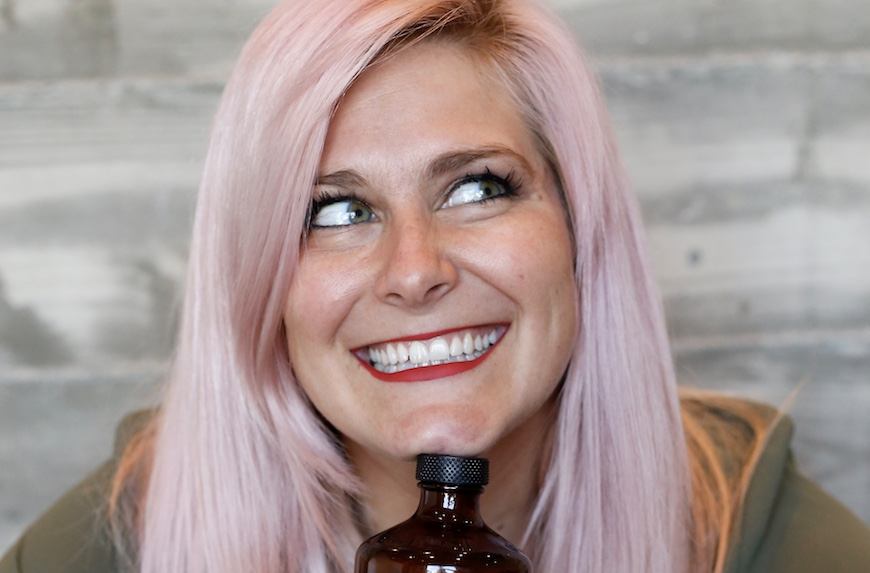
Are there early experiences that led you to take the entrepreneurial path you’re now on?
Three things come to mind: Being accustomed to change; not fitting in; and exposure to hard work. I had a pretty different childhood. I was born in Saudi Arabia, grew up in Calgary near the mountains, spent my teenage years in the Washington D.C. area, stopped in Boston for five years for graduate school, then finally landed in Los Angeles 10 years ago. Because I moved around a lot, I became fairly accustomed to change. Change is the number-one thing you have to feel comfortable with as an entrepreneur.
Not fitting in and resistance to convention is what entrepreneurial success story dreams are made from.
I also didn’t fit in [as a child]. And in adulthood, I never felt like I wanted to fit in—that’s an important part of my identity and what drives me. A note to parents of difficult kids: They may be great leaders one day! Not fitting in and resistance to convention is what entrepreneurial success story dreams are made from, because you have to start something new.
Lastly, my father always hustled and would never give up on a problem until it was solved. Especially in the beginning stages, entrepreneurship has a lot to do with hard work and figuring it out. Exposure to this sort of commitment throughout my life definitely impacted me.
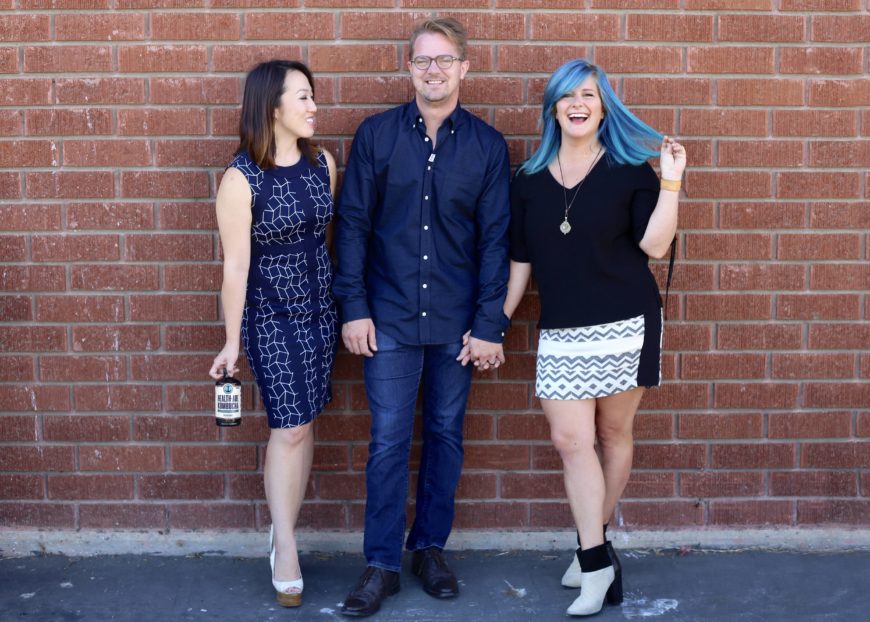
What inspired you to start the Health-Ade?
I had a steady corporate job and was moving fast “up the ladder,” but at the same time, I was feeling unfulfilled. There was a voice in my head that told me there was something more out there for me—something game-changing—and I knew I had to start something and be my own boss.
My best friend and my boyfriend (now my husband) were feeling the same way, and we decided to start an entrepreneur club to brainstorm cheap business ideas. Justin, my now-husband, was starting to go bald and wanted to stall the process. In graduate school, I was obsessed with fermentation, so I knew that, in parts of the world, they use a SCOBY [the culture used to make kombucha] as a mask on the head to protect and regrow hair. We decided to test this theory and I started making a ton of kombucha to harvest the SCOBY for the hair mask. My apartment became completely overtaken by kombucha.
There was a voice in my head that told me there was something more out there for me—something game-changing.
Because I wasn't interested in the liquid, I gave it away to my friends and neighbors. In response, I constantly heard how it was the best they'd ever tasted. A couple of weeks later, someone in the farmers’ market offered us a booth for our “hair product.” That wasn't close to ready, but we did have this great-tasting kombucha—and lots of it. We decided to try our luck. On the first day, we sold out in under an hour, and it’s been kind of like that ever since: a crazy ride of growth and hard work, when we didn’t initially expect it.
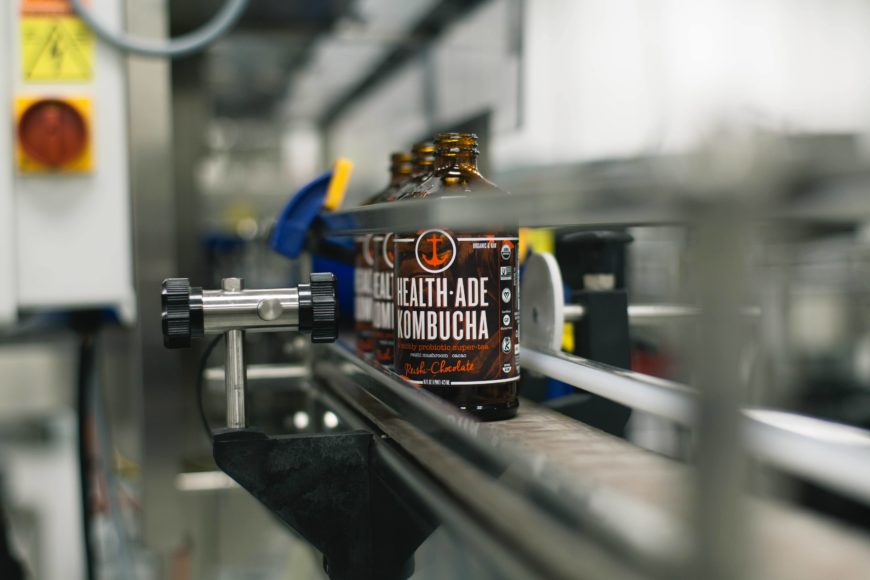
What makes your kombucha so different (and better)?
We stop at nothing to make the best-tasting and highest quality kombucha you can buy—and no one makes it like we do. We ferment 100 percent in glass to prevent plastic and metal leaching, brew in super-small batches—2.5 gallons, to be exact—and flavor with only the highest quality ingredients, like cold-pressed juice from organic produce. Overall, we’re proud to make real kombucha—we let the brew tell us when she’s ready, and we don’t add to or mess with the natural process at all.

{{post.sponsorText}}
Were there any unforeseen challenges early on?
Starting a business is nothing but challenges! Probably the biggest ongoing challenge has been capital for manufacturing. Everyone loves that we hand-craft our kombucha, but they may not realize how much money it takes to build your own brewery and expand.
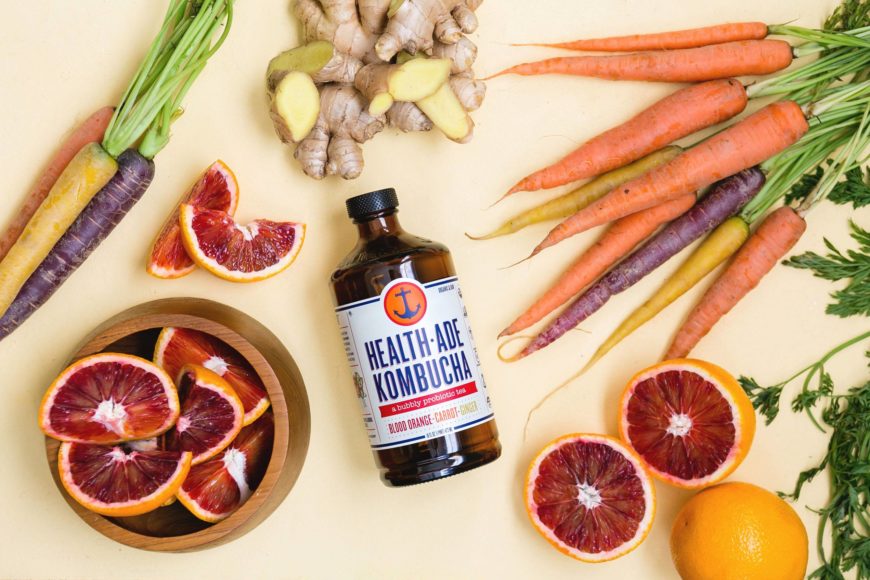
How did you decide whether to bootstrap the business, seek angel investors, or take VC money?
In July of 2013, we realized we needed investment when we maxed out our credit cards at $50,000 and they wouldn’t extend us more credit. Also, it was clear we needed to increase efficiency in a serious way. We were still making it completely by hand, and I bet a bottle was costing us $10 to make, even though we were selling it for $5. Machinery could help us do this, but the equipment we needed cost over a million dollars.
My advice to others is this: Go as far as you can on debt.
We got very lucky when we met fellow entrepreneur Tom First; he had started Nantucket Nectars and was now working for a successful private equity firm called First Beverage. They saw the potential in us and took a risk. In the end, my advice to others is this: Go as far as you can on debt. After that, find good people with experience to invest in you.
Can you tell me about a key decision you made that was a turning point for Health-Ade, but that frankly could have gone either way?
One of the biggest milestones was when Justin and I quit our jobs. We had no income and were only selling in the farmers’ market. As soon as we recognized that two of us could only accomplish so much, we went on Craigslist and posted something along the lines of, "Who wants to work for us for free and we’ll give you a percentage when we get paid by a store?”
Hundreds responded. We ended up taking on 20 people, mostly part-time yoga instructors and actors—so it wasn’t the easiest thing to manage! Three individuals in particular gave it their all and helped us build this brand, and they still work for us today. It’s amazing to think that Health-Ade is now available nationwide in more than 12,000 accounts, including Whole Foods Market, Target, Walmart, Safeway/Albertsons, and Sprouts.
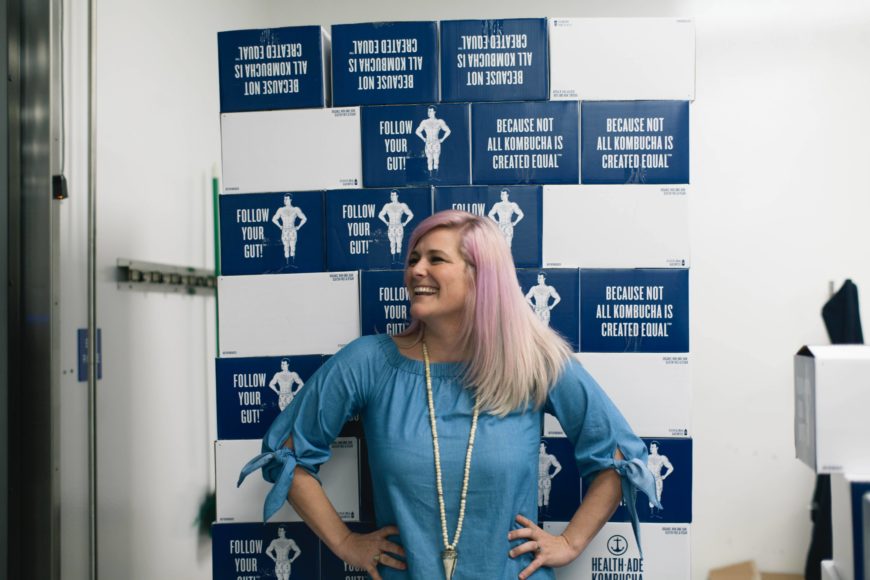
How do you walk the walk as a wellness company?
We don’t care about what color your hair is! We're not super corporate, so I let people ask me for what they need and the answer is usually yes.
As a business in this space, we recognize our responsibility to improve our community, both locally and globally, so that more people have opportunities to be happy and healthy. This year, we’ve partnered with the Garden School Foundation to support their flagship school garden, where underserved students experience nature and real food—sometimes for the first time. We brought all of our employees there for a day of garden work in December and it was a blast!
As a business in this space, we recognize our responsibility to improve our community.
We’re also taking big steps to make our office and manufacturing facility more sustainable by composting, reducing waste, and increasing what we recycle and repurpose.
A business owner’s to-do list is always long. Please share your favorite efficiency hack.
Especially for women, we tend to take on a lot of things and wear a lot of hats. We run businesses, raise our kids, and then want to take care of the house. There is no way to be 100 percent of everything—I gave up on that a long time ago. I hire for help with the laundry, with cleaning, and a nanny. I use Instacart. I have a treadmill desk and at least a few times a week I make myself do a fitness class. But after work I want to spend time with my baby or sit down and have a glass of wine. In the end, I get a balance.
Health-Ade is so delish, it makes you wonder: How much kombucha is too much? And here's the lowdown on kombucha that actually gets you buzzed.
Loading More Posts...